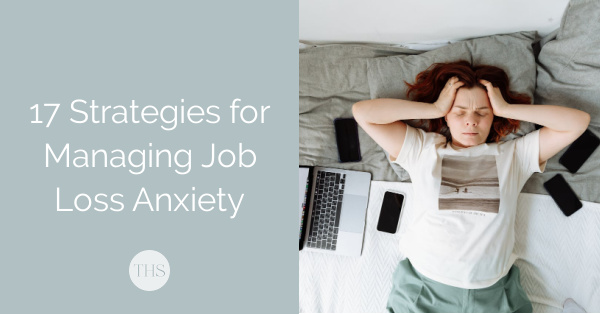How to Create a Mental Health Toolkit for Chronic Illness

“Anxiety’s like a rocking chair. It gives you something to do, but it doesn’t get you very far.” ― Jodi Picoult
Job loss can have a profound impact on your mental health and well-being, especially when it’s tied to your health situation. It can lead to feelings of depression, hopelessness, and low self-esteem due to financial instability, loss of identity, along with uncertainty about the future.
The lack of structure and social interaction that a job provides can trigger feelings of financial strain and social isolation. Prolonged unemployment may worsen these negative emotions in you, leading to a decrease in life satisfaction, increased feelings of hopelessness, and a higher risk of developing a severe mental health disorder.
Through this article, I am aiming to provide practical strategies and actionable steps to help you cope with the stress and anxiety associated with job loss. By offering guidance on managing emotions, seeking support, and developing a positive mindset, this content piece aims to empower people to navigate this challenging time and emerge stronger.
Job loss anxiety is a common emotional response to unemployment. It’s a complex mix of worry, stress, and uncertainty that can significantly impact an individual’s overall workplace mental health and well-being. While the financial implications are often the most immediate concern, the psychological effects can be equally profound.
Beyond the loss of income, job loss can disrupt various aspects of life:

Understanding the emotional impact of job loss is crucial for you because it affects not just your financial stability but also your psychological and emotional well-being. Job loss can lead you to a range of intense feelings, including stress, anxiety, depression, and a loss of identity, which can have profound effects on your mental health.
Job loss can be a devastating event, often leading you to a range of intense emotions.
The financial consequences of job loss can be severe.
Job loss can be a traumatic experience, and it is often helpful to view it as a grieving process. This allows you to recognize and acknowledge the various stages of emotional healing.

It’s important to give yourself time to emotionally process the loss before making any major decisions.
Job loss can have a significant financial impact on your life. So, it’s important to create a temporary financial plan to manage your expenses.
It’s crucial for you to avoid isolation during this difficult time. Reaching out to your family, friends, or professional counselors can provide you with much-needed support.

“If you can’t fly then run, if you can’t run then walk, if you can’t walk then crawl, but whatever you do you have to keep moving forward.” ― Martin Luther King Jr.
Self-care is essential for maintaining both physical and mental health, especially in times of stress or demanding work schedules. When you take care of yourself, you have more energy, focus, and resilience to handle daily challenges. Here’s how you can prioritize self-care:
When you’re dealing with the stress of losing your job and struggling to make ends meet, your diet might seem like the last thing to worry about. However, what you eat can have a significant impact on your energy levels and overall mood.
Having a structured daily routine may help you reduce stress, provide a sense of control, and ensure that important tasks (including self-care) are incorporated into your day. Routines also make it easier for you to build good habits that help engrain behaviors.
Mindfulness helps you to become aware of the present moment, which can reduce the sense of being overwhelmed or worried about your future. You may try these stress-relief techniques to manage anxiety and help navigate difficult emotions.
When integrated into your life, each of these strategies promotes better mental and physical health, reduces stress, and fosters a more balanced and fulfilling life.

“Now is no time to think of what you do not have. Think of what you can do with what there is.” ― Ernest Hemingway
Losing a job can be a significant setback, especially when it’s due to health reasons. Rebuilding confidence after this situation can be emotionally challenging, but it’s a vital step in reclaiming your sense of self-worth and moving forward. Here are some practical strategies to help you rebuild your confidence:
It’s normal to feel a range of emotions after a job loss, including frustration, guilt, or sadness. Allow yourself to process these emotions. Journaling, talking to a therapist, or sharing your feelings with supportive friends can help you work through them.
Remind yourself of the skills, qualities, and experiences that make you valuable, both personally and professionally. Chronic illness may affect a lot of areas of your life, but it doesn’t diminish all your abilities. Make a list of your strengths to remind yourself of what you bring to the table.
Taking care of your physical and mental health is crucial. Eat well, get enough rest, and engage in activities that promote relaxation. Self-care builds your energy and resilience, helping you face challenges with more confidence.
Instead of seeing the job loss as a personal failure, reframe it as a part of your journey. Viewing this aspect of chronic illness as a challenge you’re navigating, with opportunities for growth and adaptation, can help you feel empowered rather than defeated.
Avoid dwelling on the past or worrying about the future. Be kind to yourself and avoid self-criticism. Chronic illness can be unpredictable, and your value as a person isn’t tied to your productivity or job status. Recognize the effort you’re putting into adapting to a difficult situation.
Explore ways to stay engaged with the professional world, even if you’re not ready to return to full-time work. Freelancing, part-time work, or volunteering can help you maintain a sense of purpose and connection, which supports your confidence.

Keep track of your successes, no matter how small. Celebrating little wins along the way helps build momentum and reminds you that you’re capable of moving forward, even after setbacks.
Consulting an occupational physician can be an invaluable step in rebuilding confidence and finding work that aligns with your current health needs. These specialists are trained to evaluate how your chronic illness affects your ability to perform tasks and can offer personalized advice on suitable work environments. They can help identify roles or industries where your skills can be effectively utilized without compromising your health.
If you’re ready to return to work, they can also provide a work release document certifying your ability to do so, which can be helpful when communicating with employers.
When returning to work after dealing with a chronic illness, exploring possible modifications can make the transition smoother and help you maintain your health while performing your job effectively.
Start by requesting accommodations that could ease your workload or make the environment more suitable, such as flexible working hours, the ability to work remotely, or assistive technology that helps you manage specific tasks. Open communication with your employer and human resources (HR) department is key to finding mutually beneficial solutions.
Additionally, opting for ergonomic adjustments, such as specially designed chairs, desks or keyboards, can help minimize physical discomfort and strain, allowing you to remain engaged and confident at work despite the challenges posed by chronic illness.
Exploring hobbies and interests outside of work can be an important part of rebuilding confidence and finding fulfillment after job loss due to chronic illness. Engaging in activities that bring you joy—whether it’s painting, gardening, writing, or any other passion—can provide a sense of accomplishment and help you rediscover your personal identity beyond your professional life.
Volunteering is another meaningful way to stay active and connected. It allows you to give back to your community while forming new relationships and gaining a sense of purpose. In addition, learning new skills through courses or workshops not only boosts your confidence but also keeps your mind engaged and prepares you for future opportunities, whether in a new career path or a modified version of your previous role.
If you find yourself struggling with feelings of uncertainty or a loss of purpose, seeking counseling or therapy can be incredibly helpful. A mental health professional can provide you with coping strategies, emotional support, and guidance as you navigate the complexities of chronic illness and career transitions.
“Every tomorrow has two handles. We can take hold of it with the handle of anxiety or the handle of faith.” ― Henry Ward Beecher
Author Bio: Shebna N. Osanmoh I, PMHNP-BC, is a board-certified psychiatric mental health nurse practitioner associated with Savant Care, Los Altos, CA, mental health clinic. He has extensive experience and a Master’s from Walden University. He provides compassionate, holistic care for diverse mental health conditions.
For more work-related advice, take a look at Chronic Illness and a Career: Can You Have Both? or try these 11 Tips for Working from Home with Chronic Illness. You can also take inspiration from these 15 purpose quotes for a fulfilled life, even when you’re struggling.